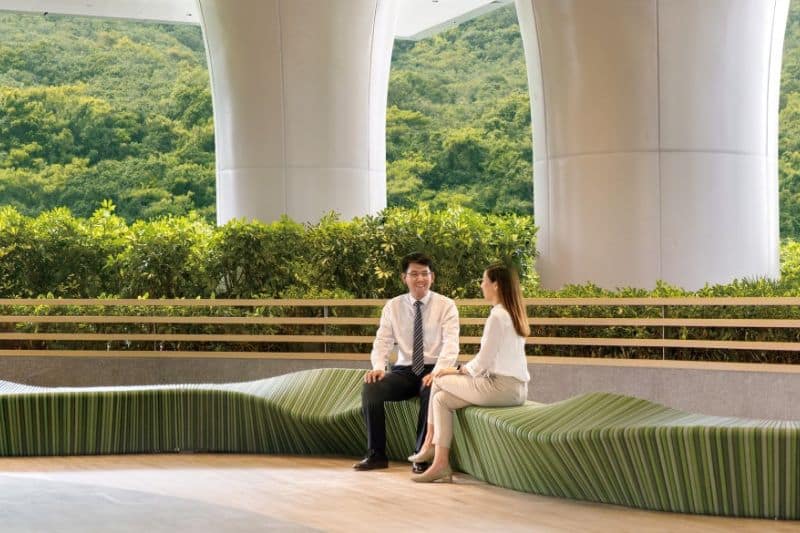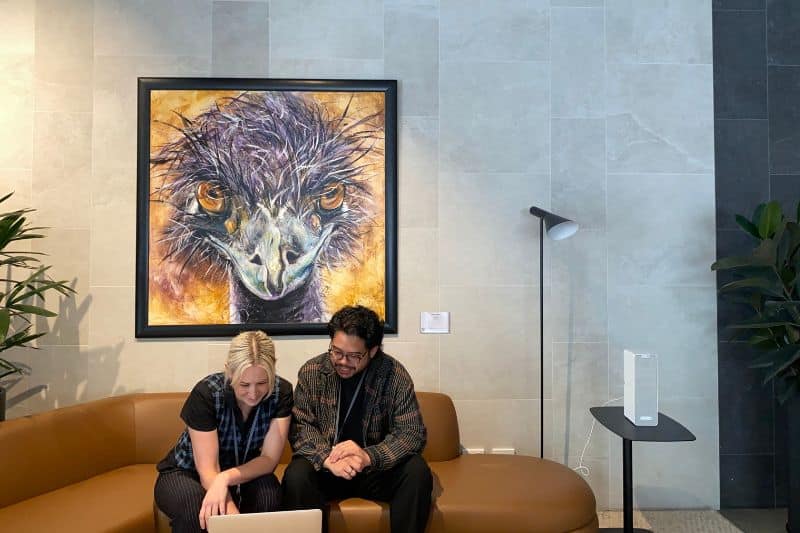Discover how the landscape of work is changing with the digital transformation of office spaces. From innovative coworking to smart technology and eco-friendly initiatives, learn how to shape a flexible, collaborative, and sustainable workspace for your business’ success.
Staying ahead requires more than just keeping pace it requires an agile stride toward innovation and efficiency. This is where digital transformation steps into the spotlight, no longer an optional trend but a strategic leap toward redefining how we work and thrive. Enter the realm of technology, collaboration, and wellbeing.
In this article, we delve into the art and science of crafting the workspace of the future – one that is agile, collaborative, and responsive to the needs of both employees and the environment. We will uncover how embracing digital transformation isn’t merely an option; it is a game-changer that can elevate your business to unprecedented heights.

Embracing Digital Transformation
Digital transformation is far from a fleeting trend; it is a strategic initiative that can revolutionise operations. Infusing technology into the core of your business can lead to enhanced efficiency, seamless collaboration, and unmatched flexibility. Consider the utilisation of cloud-based solutions such as Google Workspace or Microsoft 365, facilitating real-time collaborative document editing across geographies.
Modern project management platforms like Trello and Asana offer visual roadmaps of tasks, timelines, and responsibilities, ensuring streamlined workflows across team members. Communication tools such as Slack and Microsoft Teams provide an ecosystem for instant communication, virtual meetings, and file sharing, essential for maintaining cohesion within remote teams.

Rethinking Office Design
Gone are the days of isolated cubicles. Coworking spaces are at the forefront of the evolution in office design, emphasising collaboration and adaptability. These shared environments bring professionals from diverse industries under one roof, fostering cross-pollination of ideas. For instance, imagine an advertising specialist bouncing ideas off a tech entrepreneur while sipping coffee in a comfortable lounge area.
Meeting rooms in coworking spaces are often designed to be vibrant and stimulating, creating an atmosphere conducive to brainstorming and ideation sessions. The presence of professionals from various fields can lead to unexpected collaborations, driving innovation that might not have occurred within the confines of a traditional office space.

Prioritising Employee Wellbeing
In the contemporary professional landscape, achieving a healthy work-life balance is of paramount importance. Addressing this need involves offering amenities that promote well-being. From serene wellness rooms designed for relaxation to ergonomically optimised furniture that enhances comfort, a focus on physical and mental health becomes integral. Employees can rejuvenate by taking breaks in comfortable corners bathed in natural light and adorned with plants, consequently uplifting their mood and productivity.
Additionally, granting employees the autonomy to select their work environment and style is crucial. The freedom to operate remotely or within a shared setting caters to the diverse responsibilities and preferences of individuals. Adopting such flexibility can result in elevated job satisfaction, improved retention rates, and ultimately, enhanced business outcomes.
Leveraging Smart Technology
The workspace of tomorrow is envisioned as an intelligent and efficient environment. Automated systems, governed by smart devices, bring more than just convenience to the table; they also play a crucial role in conserving energy. Picture a workspace where lights adjust automatically based on natural light levels and occupancy, creating an energy-saving ambiance that promotes comfort for everyone present.
In this context, the Internet of Things (IoT) devices emerges as a key player in optimising space usage. Sensors discreetly gather data on occupancy patterns, enabling managers to allocate resources judiciously. For instance, if a specific area consistently remains underutilised during certain hours, the collected insights can guide decision-makers in repurposing that space for other functions, thus significantly amplifying overall operational efficiency.

Embracing Connectivity
The significance of seamless communication and collaboration cannot be overstated. Businesses today offer high-speed internet and sophisticated communication infrastructures, ensuring that teams can cooperate effortlessly whether they are situated in the same room or working remotely.
Moreover, the diverse composition of professionals within these business environments cultivates an ideal space for networking. For instance, a tech startup founder might share a workspace with a marketing consultant, igniting impromptu exchanges of insights that hold the potential for fruitful collaborations. These serendipitous interactions have the power to fuel innovation and broaden perspectives, achieving outcomes that conventional offices often find challenging to replicate.

Prioritising Sustainability
Sustainability has become paramount in today’s environmentally aware landscape, extending even to workspaces. Certain workplaces stand out for embracing eco-friendly practices with fervour. These spaces incorporate energy-efficient lighting solutions, not just for reduced energy consumption, but to create a soothing work ambiance. Imagine lights that adapt to natural light levels, saving energy while prioritising employee well-being.
Opting for a sustainability-oriented workspace goes beyond shrinking your business’ carbon footprint; it sends a bold message to stakeholders. By making this choice, you’re showcasing your dedication to ethical operations, painting your business as a responsible leader in a world that values eco-consciousness. As an entrepreneur, you’re not just selecting a workspace – you’re joining a movement that’s reshaping the future, one that’s greener and more responsible.

Cost-Effectiveness and Scalability
Setting up a conventional office involves significant costs upfront, from renting office space to buying furniture and setting up infrastructure. However, there’s a more strategic approach to consider. Rather than heavily investing in these initial expenses, explore a path that not only saves money but also fuels your business’s growth.
Imagine redirecting the funds typically earmarked for rent and furnishings toward areas that directly contribute to your business’s success. Opting for a cost-effective strategy lets you allocate resources smartly, whether it’s for product development, marketing efforts, or expanding your talent pool.

Coworking spaces provide a dynamic solution to the scalability puzzle. They offer the flexibility to match your changing needs. As your team expands, you can seamlessly grow within the same space without the complexities of negotiating new leases. Should adjustments be necessary, such as downsizing, you can make changes without the burden of long-term commitments. This adaptability not only reduces financial strain but positions your business to thrive in a swiftly changing landscape.

Ultimately, focusing on cost-effectiveness and scalability isn’t just about cutting expenses—it’s about strategically aligning resources with your business goals and ensuring your workspace evolves harmoniously with your company’s journey. This approach minimises financial risks while maximising your business’s agility and potential for success in a dynamic world.
Featured banner image credit: thehiveccgcommons.com
Related Articles
How Kieran Gibb is Revolutionising APAC’s F&B Industry at Monogic
CSR Guide: How to Foster a Sustainable Diversity and Inclusion Strategy at Your Workplace





